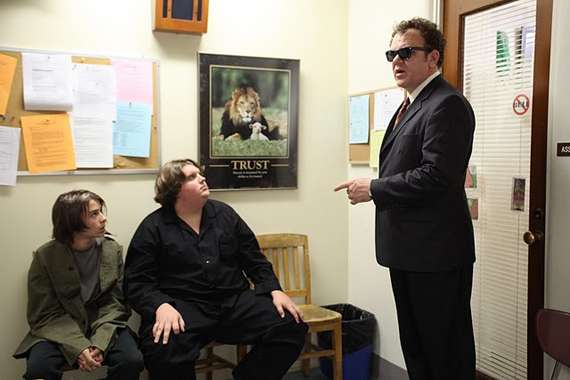 |
| Bridger Zadina, Jacob Wysocki, John C. Reilly, Terri, ATO Pictures, 2011. |
The scarcity of motion pictures accurately portraying the inner life of the American teenager belies the gross manipulation of youth culture into a disturbingly skewed teen market. The fact that it takes an 'adult' film to find the pulse and break away from the fluff and circumstance speaks to the crass materialism and farcical plasticity of the mainstream motion picture and television industry. A pseudo 'mumblecore' indie filmmaker picks up where Larry Clark, Gus Van Sant, Michael Cuesta and Catherine Hardwicke have triumphed and excelled in years past; channeling the confusion and pain of growing up, as well as the ecstasy.
Azazel Jacobs' third feature seals his reputation as one of the most thrillingly alive and crucial young talents in American cinema. After his fascinating films The Good Time Kid and Momma's Man, Terri crystallizes his vision of the outsider as creator of his own world, amid the vagaries of everyday life and the harsh cynicism of others. His camera functions as his rough hewn eyes, gazing onto encapsulated corners of America.
Terri ( an astounding performance by newcomer Jacob Wysocki) is an obese teenager staggering through a muted home life and cruel peer relationships at his high school in a hauntingly rendered anytown suburb. The wonder of Terri is that Jacobs does not judge or slant the view, other than slathering the images in his lovingly 70s fueled light. Terri keeps his head up, remains unperturbed and level throughout. The relationships he forms or continues, with his unbalanced but loving uncle James (Creed Bratton), the fatherly, awkward assistant principal (John C. Reilly) who was a misfit once himself, and the two idiosyncratic outcasts ( Bridger Zadina and Olivia Crocicchia), shape the beating heart which unifies the lived in images.
The third act breaks away from the subdued scenes which preceded it, taking flight on wings of honesty which culminate in a transcendent conclusion. This sequence recalls Nicholas Ray in his Rebel Without a Cause, as well as Larry Clark in his masterpieces Kids and Bully. The three young actors locate the core of who their characters are and make us believe in them. The truth of teenagers and high school which Jacobs makes us feel and understand demand the attention of those who crave films which are both aesthetically as well as intellectually relevant.
No comments:
Post a Comment